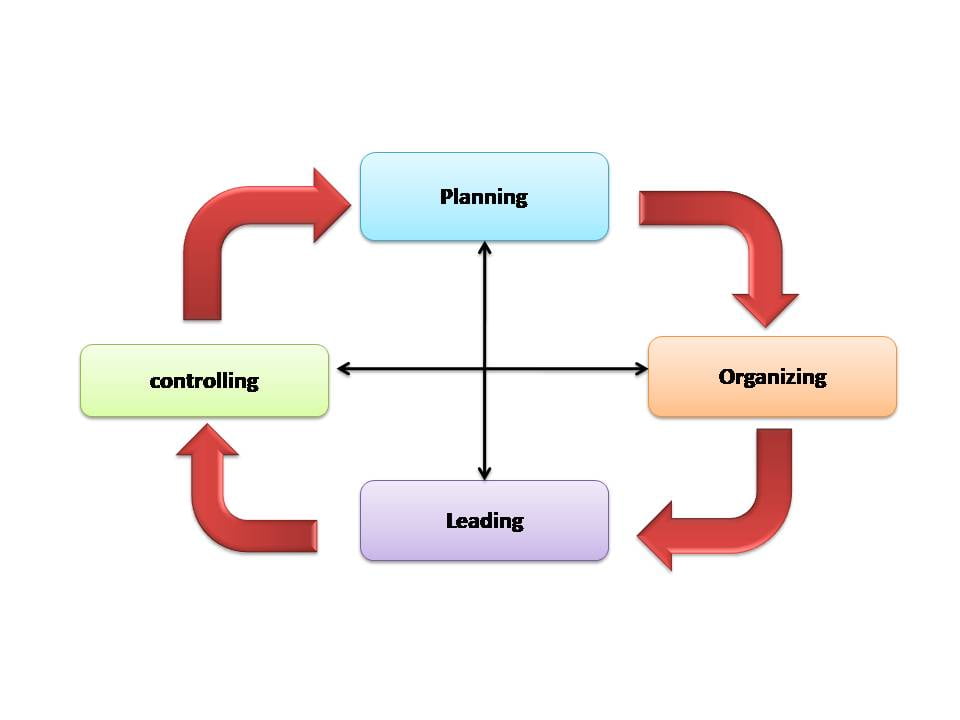Definition of management.!!! Many management students are very interested in management, usually looking for a specific definition of management. This chapter includes management definitions, the importance of management, management process, and some core concepts in management. After reading this, you will gain a good basic knowledge about management.

when considering about definition of management There are many definitions for management. Basically, management means the process of planning, organizing, leading, and controlling in a changing environment to achieve specific organizational goals and objectives.
According to (James Arthur Finch Stoner, 1995) management is the process of planning, organizing, leading and controlling the work of organization members and of using all available organizational resources to reach stated organizational goals.
Core concepts of management
When considering all of the above definitions, all of the definitions include some common keywords. Organization, goals and objectives, efficiency, effectiveness, resources, and productivity are the keywords that appear on the above definitions. Also, these keywords called core concepts of management.
Resources
Organizations use resources to produce goods or services. Land, workforce, capital, entrepreneurship, information, time, and knowledge are the resources of an organization. Also, resources can be recognized as 5Ms (Men, Materials, Machinery, Minutes, and Money).
Goals and objectives
An organizational goal means a position that an organization hopes to achieve in the Long-run. Usually, goals have a long-time frame and also have a clear path. When an organization has a clear, realistic goal, it is very easy for achieving organizational success.
Examples for organizational goals
- Be the leading company in the industry
- Entering the international market in 20XX
- Establishing new branches island widely within the next 15 years.
When it comes to objectives, an organizational objective is a situation that an organization seeking to achieve in the short-term. Therefore, objectives have a short-timeframe. Also, objectives should be SMARTER. It means organizational objectives have specific characteristics.

Examples for organizational objectives
- Increasing sales in next year
- Serving good service for the customers
- Hire talented employees
- Improve workforce skills
- increase the market share by 10% next year.
Efficiency and effectiveness
Efficiency refers to the ability to produce goods or services (output) with a minimum amount of input (resources). And also efficiency can define as doing things right.
Effectiveness refers to doing the right things. It means achieving the right goals for the organization.
Productivity
Productivity is a combination of efficiency and effectiveness. It means when an organization doing the right things in the right way, there is productivity. And also productivity is the ratio of outputs.
Management process
A process is a systematic way or method of doing some activities. In the management process, there are four activities. Planning, organizing, leading, and controlling are the four functions of the management process. Every function is interrelated with each other as well as the impact on each other. By performing these functions, organizations are able to accomplish their goals and actives.

Planning
Planning is the process of establishing the goals and objectives of an organization and taking actions to achieve them. This function determines that the organization can get where it wants to be in the future and what will do to get there.
Organizing
Organizing refers to a systematic process of arranging organizational resources and developing an organizational structure to accomplish the organization’s goals and objectives.
Leading
This is a process of influencing employees to motivate and give directions, state a clear vision for achieving goals and objectives. The final result of this leading function is a high level of a motivated workforce to the organization.
Controlling
Controlling is the function of observing the duties of individuals and groups to ensure that planning, organizing, and leading functioning effectively. This function is very useful to evaluate the difference between actual results and the excepted result.
Importance of management
Management plays a vital role in the organization. Therefore it is essential. The importance of management as follows
- The success, as well as the failure of the organization, depends on the management.
- Management helps to utilize organizational resources effectively.
- It saves the overall cost of the organization.
- Helps to achieve organizational goals and objectives
- Able to operate business functions wits a motivated workforce
- Profitability increases.
- The managers are able to make better decisions for organizational success.
Summary
- When it comes to the definition of management, Management is the process of planning, organizing, leading, and controlling in a changing environment to achieve specific organizational goals and objectives.
- Organization, goals and objectives, efficiency, effectiveness, resources, and productivity are the core concepts of management.
- Recourses are Men, Materials, Machinery, Minutes, and Money
- The management process includes Planning, organizing, leading, and controlling functions.
- Management is essential for the organization.





